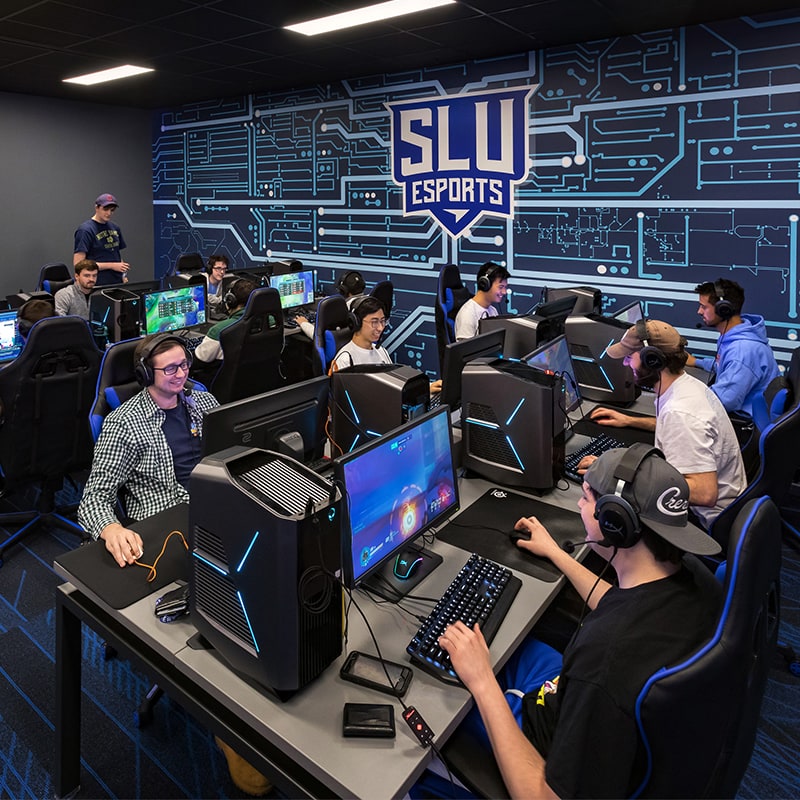Game On: The Case for E-sports

Wednesday, April 28, 2021
E-sports is undoubtedly one of the biggest movements reinvigorating student life on college campuses. A growing global industry, e-sports events have made their mark on the economy, attracting the interest of major brands like Adidas, Coca-Cola, Samsung, Mastercard, and Sony. Through streaming services like Twitch, YouTube Gaming, and Mixer, tournaments reach millions of fans around the world and surpass the viewership of even the most influential athletic events such as the Super Bowl and NCAA March Madness. As campus architects, we see first-hand the way that e-sports programs can transform a campus community. Such programs hold promising potential to attract and retain students, as well as prepare them for life after college. Some of our resident e-sports experts have collaborated to highlight the biggest benefits of adding or enhancing a collegiate e-sports program.
- E-sports programs enhance collegiate student life. As Principal Chris Chivetta thoughtfully comments, “E-sports bring people together from across campus. It’s a sport anybody can do.” The presence of an e-sports program provides yet another outlet for students to collaborate, compete, and learn, connecting potentially isolated students to each other and their school. It is a way for colleges and universities to provide opportunities that align with the modern interests of their students. Some institutions even offer scholarships for students to play e-sports. Saint Louis University, whose team was founded in 2017, now offers 12 scholarships of up to $2,000 for members of the varsity gamers who call their newly renovated E-Sports Gaming Lab a home away from home. Project Designer Will Schenck also weighed in on the growing support for these tech-driven programs. “Parents who may be skeptical of e-sports and video games, as soon as their student can come home and say ‘Mom and Dad, I just got an $8,000 scholarship offer to play Overwatch at this university,’ suddenly something clicks in their brains and they think, ‘Maybe there is something to this,” says Schenck. This viral interest has spurred interest in e-sports programs among all age groups, including high schools and elementary schools.
- E-sports programs prove to be an invaluable enrollment driver. Collegiate e-sports teams often attract nontraditional students and offer the chance to join the emerging field of professional competitors. E-sports can be a cost-efficient way to put a college or university on the map. Our first e-sports facility, the Columbia College Game Hut was once just a small maintenance garage that did not add much value to campus. Today, the Columbia College e-sports team is known as a trend-setter in the competition world to due their Game Hut. As Chris Chivetta comments, the Game Hut is “a perfect example of a small space being reclaimed into a social space with performance and practice areas.” E-sports facilities are efficient business models that are changing curriculums and creating new spaces on campus.
- E-sports programs can serve as the foundation for a successful post-graduation career. Like other collaborative co-curricular activities, e-sports build cross-disciplinary connections among people with interests as diverse as marketing, computer science, communication, and management. Involvement in e-sports can be a springboard into a multitude of post-graduation career opportunities in areas including: Professional E-sports Player; Coach or Analyst; Shoutcaster/Host; Broadcast Production; Public Relations & Marketing; Sales & Partnerships; Team Ownership & Management; Agent or Event Manager; Statistician, Lawyer, or Finance; and Game Developer. Often the presence of an e-sports program and facility attracts the attention of the larger community. Corporate recruiters in the technology and gaming industry may be attracted to campus knowing that e-sports competitors are likely to be individuals best suited for careers in coding, project management, or graphic design. Even students not fully invested in gaming can join in on the action. At some universities, nutrition and physiology programs are engaged to help determine the best health regimens for gamers. An e-sports program offers substantial real world experiences and connections that can serve students well long after graduation.
To learn more about the future of e-sports and how creating or upgrading a practice and competition facility can transform your campus, contact Chris Chivetta at [email protected] or (314) 863-5717.